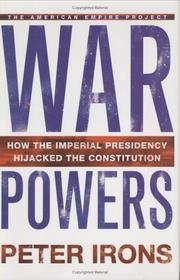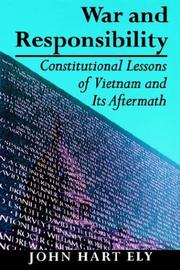| Listing 1 - 5 of 5 |
Sort by
|
Book
ISBN: 0813908086 9780813908083 Year: 1981 Publisher: Charlottesville: University Press of Virginia,
Abstract | Keywords | Export | Availability | Bookmark
 Loading...
Loading...Choose an application
- Reference Manager
- EndNote
- RefWorks (Direct export to RefWorks)

ISBN: 0805075933 9780805075939 9780805080179 0805080171 Year: 2005 Publisher: New York : Metropolitan Books,
Abstract | Keywords | Export | Availability | Bookmark
 Loading...
Loading...Choose an application
- Reference Manager
- EndNote
- RefWorks (Direct export to RefWorks)
War and emergency powers --- History --- United States --- Pouvoirs exceptionnels --- History. --- Histoire. --- War and emergency powers - United States - History

ISBN: 0691025525 9780691025520 Year: 1995 Publisher: Princeton (N.J.) Princeton University Press
Abstract | Keywords | Export | Availability | Bookmark
 Loading...
Loading...Choose an application
- Reference Manager
- EndNote
- RefWorks (Direct export to RefWorks)
Book
ISBN: 9781451681987 9781451681970 1451681976 1451681984 Year: 2017 Publisher: New York [etc.] Simon & Schuster
Abstract | Keywords | Export | Availability | Bookmark
 Loading...
Loading...Choose an application
- Reference Manager
- EndNote
- RefWorks (Direct export to RefWorks)
"A timely account of a raging debate: The history of the ongoing struggle between the presidents and Congress over who has the power to declare and wage war. The Constitution states that it is Congress that declares war, but it is the presidents who have more often taken us to war and decided how to wage it. In Waging War, United States Circuit Judge for the United States Court of Appeals David Barron opens with an account of George Washington and the Continental Congress over Washington's plan to burn New York City before the British invasion. Congress ordered him not to, and he obeyed. Barron takes us through all the wars that followed: 1812, the Mexican War, the Civil War, the Spanish-American war, World Wars One and Two, Korea, Vietnam, Iraq, and now, most spectacularly, the War on Terror. Congress has criticized George W. Bush for being too aggressive and Barack Obama for not being aggressive enough, but it avoids a vote on the matter. By recounting how our presidents have declared and waged wars, Barron shows that these executives have had to get their way without openly defying Congress. Waging War shows us our country's revered and colorful presidents at their most trying times--Washington, Lincoln, Theodore Roosevelt, Franklin Roosevelt, Truman, Eisenhower, John F. Kennedy, Johnson, both Bushes, and Obama. Their wars have made heroes of some and victims of others, but most have proved adept at getting their way over reluctant or hostile Congresses. The next president will face this challenge immediately--and the Constitution and its fragile system of checks and balances will once again be at the forefront of the national debate"--
WAR AND EMERGENCY POWERS--USA--HISTORY --- USA. CONGRESS--HISTORY --- PRESIDENTS--USA--HISTORY --- EXECUTIVE POWER--USA--HISTORY --- LEGISLATIVE POWER--USA--HISTORY --- War and emergency powers --- War, Declaration of --- Constitutional history --- Presidents --- Executive power --- Legislative power --- History --- United States. --- United States --- War [Declaration of ] --- United States. Congress --- IS (Organization) --- War and emergency powers - United States - History --- War, Declaration of - United States - History --- Constitutional history - United States --- Presidents - United States - History --- Executive power - United States - History --- Legislative power - United States - History
Book
ISBN: 022604842X 9780226048420 1299737668 9781299737662 9780226048253 022604825X 9780226048390 022604839X Year: 2013 Publisher: Chicago : University of Chicago Press,
Abstract | Keywords | Export | Availability | Bookmark
 Loading...
Loading...Choose an application
- Reference Manager
- EndNote
- RefWorks (Direct export to RefWorks)
"It is the nature of war to increase the executive at the expense of the legislative authority," wrote Alexander Hamilton in the Federalist Papers. The balance of power between Congress and the president has been a powerful thread throughout American political thought since the time of the Founding Fathers. And yet, for all that has been written on the topic, we still lack a solid empirical or theoretical justification for Hamilton's proposition. For the first time, William G. Howell, Saul P. Jackman, and Jon C. Rogowski systematically analyze the question. Congress, they show, is more likely to defer to the president's policy preferences when political debates center on national rather than local considerations. Thus, World War II and the post-9/11 wars in Afghanistan and Iraq significantly augmented presidential power, allowing the president to enact foreign and domestic policies that would have been unattainable in times of peace. But, contrary to popular belief, there are also times when war has little effect on a president's influence in Congress. The Vietnam and Gulf Wars, for instance, did not nationalize our politics nearly so much, and presidential influence expanded only moderately. Built on groundbreaking research, The Wartime President offers one of the most significant works ever written on the wartime powers presidents wield at home.
Executive power -- United States. --- Politics and war. --- War and emergency powers -- United States -- History -- 20th century. --- War and emergency powers. --- War and emergency powers --- Executive power --- Politics and war --- History --- general constitutional law, institutions history, legislative authority, united states congress, us president, american political thought, leadership, the founding fathers, policy preferences, debates, government, emergency powers, warfare, wartime, military power, world war ii, post-9/11, afghanistan, iraq, times of peace, 20th century, spending, stateside attacks, great society, vietnam, conservatism, usa patriot act, pearl harbor.
| Listing 1 - 5 of 5 |
Sort by
|

 Search
Search Feedback
Feedback About
About Help
Help News
News